On this 223-kilometer bus ride to Korea’s east coast, I had two seat mates. The first was a young woman who had recently been through plastic surgery; I could see her bruised face underneath a mask. The second was a burly man who reeked of tobacco. The main purpose of my trip was something I appreciated just by peering out the window—the Buryeong Valley. I had read in more than one place that it was “the Grand Canyon of Korea.” At the bottom of a deep crevasse ran the Wangpi River, surrounded by a thick forest and strange rock formations. It was a beautiful scene, no doubt. But any comparison with Arizona’s huge and sublime Grand Canyon is specious, deceptive and just plain wrong. As fond as I am of Korea, there is nothing remotely like the Grand Canyon here.
Who knew monkeys were such splendid athletes?
We pulled into Uljin’s bus terminal a little after 2 p.m., and it did not take me long to find a hotel room. With the Lunar New Year holidays going on, the city (which I had visited in 2010) was fairly quiet. I found a leaflet for the Uljin Aquarium and went in search of it. On the way there, I came upon Mangyang Beach which faces the East Sea. I have heard it is a fine place to watch the sunrise. I met a father and his son 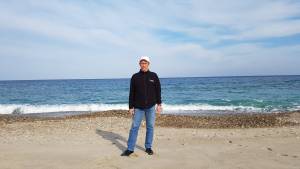 making sand castles, the former of whom graciously took a couple of photos of me. Close by was Uljin Expo Park—site of eco-tourism expositions in 2005, 2009 and 2013. The aquarium was among the main surviving components. Who doesn’t like going through an aquarium and watching the fish swim here and there? I did not stay long, however. I was fairly indifferent to the remnant of a zoo, and then I got quite a surprise. A large cage held perhaps a half-dozen Japanese cacique monkeys. They were puttering around, not doing much of anything and then suddenly there was an altercation. Two of them got into a screaming, howling fight. Dominance and submission is a key part of these animals’ social life; the weaker of them went running, chased closely by the stronger. It was simply amazing to see the speed with which these guys (assuming they were male, although maybe not) leaped, climbed and ran from one side of the cage to another, then the ceiling, dropping to the floor and starting over again. I could hardly believe such dexterity! Along with a Korean couple, I watched, laughed and feared for the safety of the monkey being chased. After about 90 seconds of flying around the cage like a pair of whirling dervishes, they appeared to have grown exhausted and stopped. Other than the precipitating fight, this may have just been a game to them.
making sand castles, the former of whom graciously took a couple of photos of me. Close by was Uljin Expo Park—site of eco-tourism expositions in 2005, 2009 and 2013. The aquarium was among the main surviving components. Who doesn’t like going through an aquarium and watching the fish swim here and there? I did not stay long, however. I was fairly indifferent to the remnant of a zoo, and then I got quite a surprise. A large cage held perhaps a half-dozen Japanese cacique monkeys. They were puttering around, not doing much of anything and then suddenly there was an altercation. Two of them got into a screaming, howling fight. Dominance and submission is a key part of these animals’ social life; the weaker of them went running, chased closely by the stronger. It was simply amazing to see the speed with which these guys (assuming they were male, although maybe not) leaped, climbed and ran from one side of the cage to another, then the ceiling, dropping to the floor and starting over again. I could hardly believe such dexterity! Along with a Korean couple, I watched, laughed and feared for the safety of the monkey being chased. After about 90 seconds of flying around the cage like a pair of whirling dervishes, they appeared to have grown exhausted and stopped. Other than the precipitating fight, this may have just been a game to them.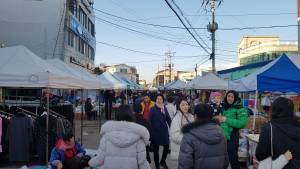
In the remaining hours of this Saturday, I wandered through the Uljin market and the streets of downtown, and entered a restaurant that served Korean porridge. A mother–daughter team served me and answered questions about how I could get to the hot springs of Deokgu the next morning.
Uljin’s mixed feelings about nukes
On our way up, I saw what at first looked like a military fortification or a prison—tall fences with barbed wire on top and stay-away signs. In fact, this was the Hanul Nuclear Power Plant. The first unit went online in 1988, and it now has a capacity of 5,881 megawatts. As such, it is the third biggest nuclear power facility in the world. Uljin County had fought against its installation back when Kim Dae-jung was in office. But the plant proved to be a boon to the economy, and the population grew. Restaurants (and classrooms) were full, and many apartment complexes were built. When Moon Jae-in moved into Cheongwadae, however, that policy changed drastically. Construction of new reactors was canceled, along with subsidies to the county. I am uncertain about the government’s long-term plans for this big nuke facility. Some people are complaining bitterly, but not all. I had seen a poster at a bus stop in the city which purported to be made by a young girl named Nayeon. She said she just wanted to live safely with her mom and dad, and that Uljin should be famous for its snow crabs instead of a nuclear power plant.
The bus got to Deokgu, and I paid the 35,000 won entrance fee. The lady behind the counter did not hear me mutter, “Damn, this place is not cheap. It better be good!” I will just say it was nice and pleasant, I enjoyed myself, and the genders were not separated; we wore bathing suits. I soaked indoors and outdoors, and if there were 500 customers just one—me—was not Korean. That should not be regarded as a complaint.
After two hours, I hopped on a bus back to Uljin and transferred to another one. Now I was on my way to Baegam’s hot springs. Both had been in operation (although I wonder when all this became commercialized) 600 years ago. The second bus only went to Pyeonghae, and I was still seven kilometers short. Trying to suppress my shame, I walked into a police station, bowed slightly and said, “anyeonghaseyo” to three officers. When they grasped that I needed to reach Baegam, the senior cop apparently told the two younger ones to take me there. I thanked all three of them profusely. On the 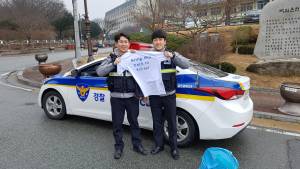 way, we had a lively conversation. I called my pretty and charming girlfriend and let her talk to them for a couple of minutes. When we arrived, I gave them a “Bring Jikji back to Korea” T-shirt and suggested they use the old kai-bai-bo game to decide who would keep it.
way, we had a lively conversation. I called my pretty and charming girlfriend and let her talk to them for a couple of minutes. When we arrived, I gave them a “Bring Jikji back to Korea” T-shirt and suggested they use the old kai-bai-bo game to decide who would keep it.
More aqua-therapy
Two people in the Baegam tourist booth arranged for me to move into the nearby Herb Motel, helped me buy a bus ticket back to Seoul for the following day and said I had numerous hot-springs emporiums from which to choose. I walked into the biggest, paid 8,000 won and had two more hours of aqua-therapy. As is more customary, it was men here and women there, and au naturel. As at Deokgu, this one claimed to offer natural spring water rich in potassium, calcium, chlorine, bicarbonate ions, magnesium and so on. Healing of body and mind were all but guaranteed.
Back in the dressing room, several guys were gathered around a television gazing intently at a mixed martial arts bout in the USA. One muscular man beat another bloody and senseless before raising his hands in delirious triumph. Then a couple of women entered the octagon—same thing. This stuff is not for me.
Because of the holidays, most restaurants were closed. I found one run by a woman who apparently lives on the premises. I ordered seolleongtang, a soup in which thin slices of beef are served amid onions, salt, ground black pepper and minced garlic. Later, I walked to a second-floor coffee shop. In no hurry, I finished reading Everest / The First Ascent by Harriet Tuckey and started Citizens of London / The 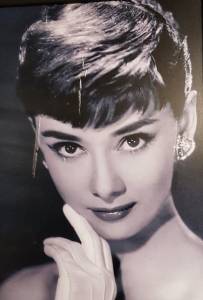 Americans Who Stood with Britain in Its Darkest, Finest Hour by Lynne Olson. What made this place notable was a series of photographs of the gamine Audrey Hepburn, the inspiration for my GF’s cognomen.
Americans Who Stood with Britain in Its Darkest, Finest Hour by Lynne Olson. What made this place notable was a series of photographs of the gamine Audrey Hepburn, the inspiration for my GF’s cognomen.
Pats win again
Since the bus did not leave until early Monday afternoon, I could have gone for some more hot-springs soaking. Instead, I watched Super Bowl 53 (New England Patriots 13, Los Angeles Rams 3) on TV and went back to the very same restaurant and coffee shop. My adventure was not quite over, though. At the bus terminal, I met Kim Jeong-hun, a mechanical engineer for Samsung. This man, who went by “Jackie” since he resembled the Hong Kong actor Jackie Chan, was interesting and funny. Just like one of the cops who had brought me there, he asked why, after more than 11 years, I had yet to master the Korean language. “Jackie,” I said in earnest reply, “I’ve tried and I’m still trying.”

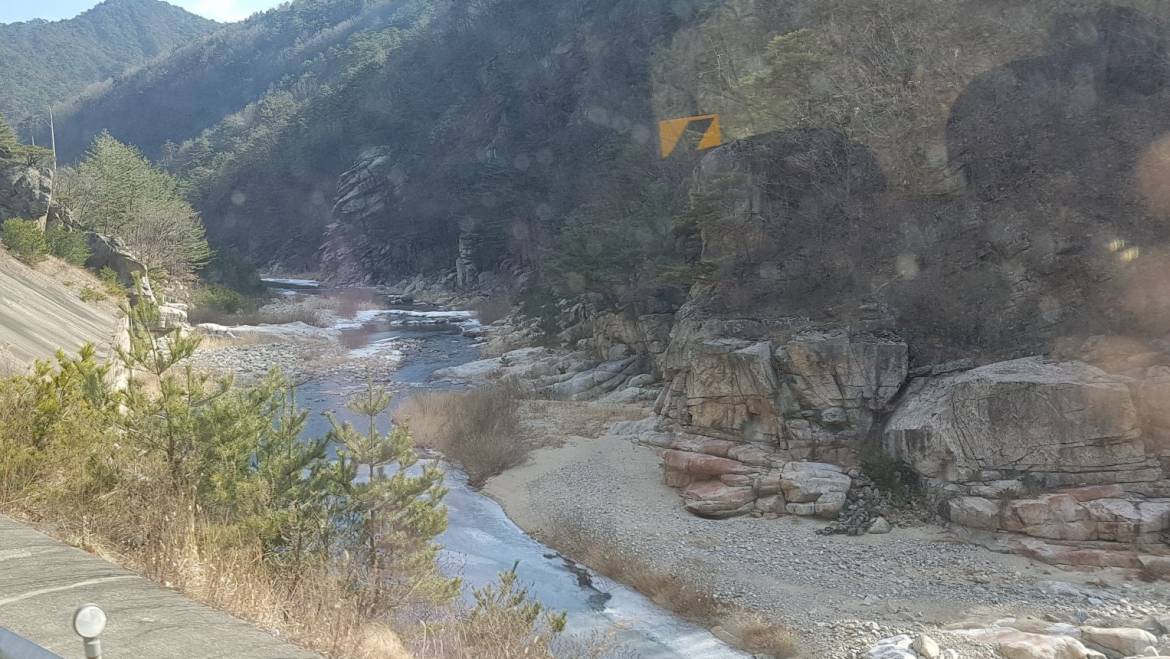
6 Comments
You are excellent tour guide and tourist. You are doing two jobs at the same time. You are only foreigner who is doing the jobs probably throughout Korean history.
I read your Korea Times article. You reminded to the audience how much smoking cauise you miserable or kill yuou. I thinkj you are the only one who cares Korean people’s health.
You said only one wrote his feedback of your articles. Majority of audience do no leave feedback. I think many readers think you are great and enjoy your article
Yong Yoon
Director, Korean Solidarity for Anti Corrupltion
#1115 Hanllaclassic, 23 84gil, Kangnam-gu, Seoul, Korea
Thank you, Mr. Yoon. I agree it’s kind of sad that I do not get more comments. I spent $5,000 on this web site just so I could have more readers and interact with them.
Thanks to you, I got to know a new side of Uljin. Thank you for your interesting essay.!
Bomin, it was one heck of a journey…I will never forget it!
Hey, RAP, what can you tell me about aqua-therapy? Fun article which had an excellent beginning wherein you mentioned that your trek would come nowhere close to that you experienced in the Grand Canyon.
It was a nice place, Dex, but not even close to the GC.
Add Comment